Rockwell Engineering’s growth plan set to deliver more expansive service offerings to FDI clients
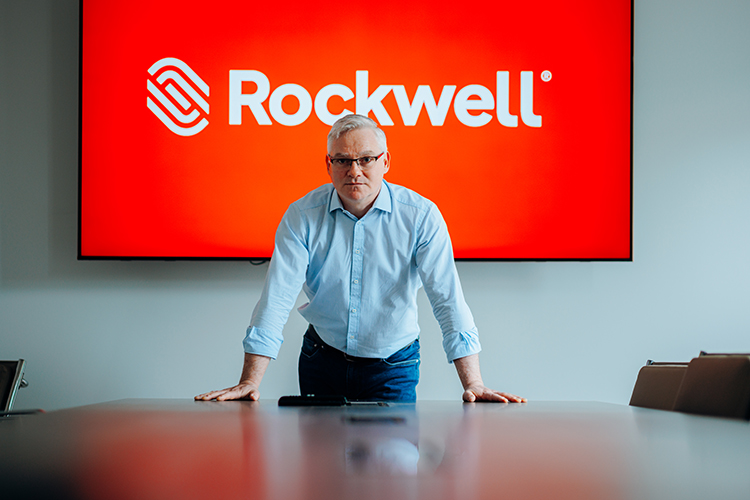
On taking up his post as managing director of Rockwell Engineering, Garret Murphy was tasked with doubling the company’s workforce to 400 employees and increasing annual turnover to €80m plus in the next five years. He speaks with ROBBIE COUSINS about how this is going to be achieved.
Rockwell Engineering was founded in Co Cork in 1981 by the late Harri Kaiser. He developed the business across several fronts but gained a good reputation for HVAC, cleanrooms and utility pipework, maintaining a steady workflow for nearly 20 years.
Martin J Conheady became the managing director on Harri Kaiser’s retirement in the late 90s. Conheady, with then newly appointed director of engineering Jim Devaney, set about developing the business over the next 20-plus years to a point last year when it had a turnover of about €40m.
While the company maintained its reputation for quality HVAC services, it also provided turnkey cleanroom fabrication and construction, as well as ductwork and pipework fabrication services, with a client base that included key pharma, semiconductor and other FDI firms with a presence in Ireland.
In early 2023, Martin Conheady and Jim Devaney signalled their intention to retire, and a succession plan was put in place by company owners, the Limerick-based investment firm Cerus Partners.
A new era at Rockwell Engineering
Rockwell employs over 200 people directly. In addition to its head office, two workshops and manufacturing facilities in Cork, it has facilities supporting projects in Dublin, Longford, and Sligo.
In June of last year, Rockwell announced that Garret Murphy would succeed Martin Conheady as managing director, and he took up the position in September.
Garret Murphy’s resumé includes periods with daa, DPS Engineering and Jacobs Engineering, where, amongst other projects, he worked as a commercial manager on large bio-pharma and semiconductor contracts.
Once inside the Rockwell Engineering business, Garret Murphy quickly bolstered his senior management team with complementary skills, appointing Sean Little, a former construction manager with PM Group, as Rockwell’s new operations director and Conor Hennessy as director of strategy. Another critical appointment was bringing in HR consultant Joe Torpey as human resources director to ensure an organised transition and to develop the new leadership into a team.

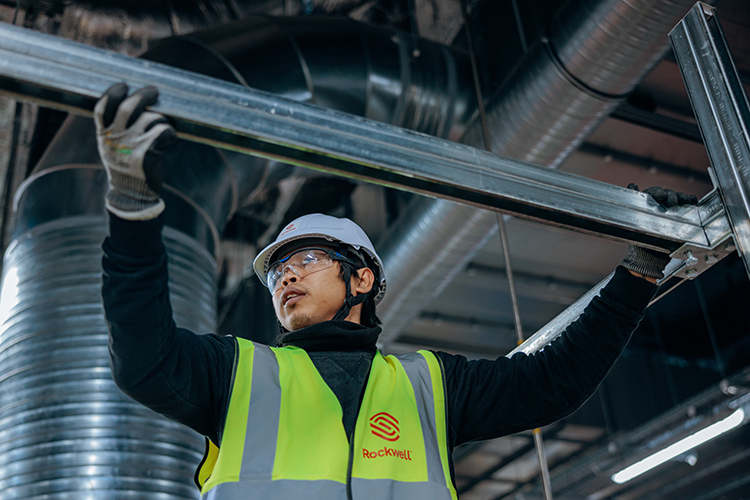
Rockwell Engineering’s record
Opening our conversation, Garret Murphy discusses his predecessors’ achievements and his plan to build on their legacy over the next six years.
He explains: “I first worked with the team from Rockwell during my time as a commercial manager with Jacobs on the BMS site, where Rockwell had a large HVAC contract. At that time, I had no idea about the extent of the company’s operations.
“When my appointment was confirmed, I began to examine the extent of the operations and the legacy my predecessors had created over the previous 40 years.
“What impressed me most was the corporate culture and ethos that was in place. There is a real collegiality across our operations, and the scope of operations that are in place provides an enormous base for us to build on over the coming years.”
Ambitious plans
Garret Murphy and his senior management team have a clear ambition for where they want to bring Rockwell Engineering over the next six years.
“At the moment, the company employs 200 people directly and has a turnover of €40m. I aim to double these figures to 400 people employed and achieve a turnover of €80m, then to increase those figures again, exceeding €100m in turnover by 2030. Having looked at all aspects of the business at this stage, I see these as realistic goals to be aiming for.”

The Rockwell Engineering brand
The first step in achieving this is relaunching the Rockwell Engineering brand with a refreshed corporate logo and a new website to inform existing and future clients about how Rockwell can meet many of their M&E and process needs from its in-house resources.
“My predecessors built a very strong business, but the market is not fully aware of all the expert services we provided,” he comments. “For instance, Rockwell might have had an HVAC contract with one client, but that client did not know the full extent of the expertise that the company had built up and some of these services will be of interest. Rockwell was providing a single service to multiple clients, and both Rockwell and our clients can develop further opportunities to apply economies of scale and integrate operations.
“Our first objective is rectifying this knowledge vacuum, and in addition to a refreshed logo, we are launching a new website and talking to clients and as many media outlets as possible to get the message out there. This will be our key focus in 2024.”
He continues, “We will also launch our ‘Rockwell 2030’ plan soon. Our new director of strategy, Conor Hennessy, is working on this plan with his team. We will first look to offer our existing clients a more integrated and expansive service, as well as bringing on new clients, particularly in the FDI field.”
Murphy is very excited by the prospect of the challenge that lies ahead, but he is in no doubt that none of this will be achievable unless he can bring the Rockwell workforce with him and have them become the driving force of the plan.
“As I have said, Rockwell Engineering has an amazing corporate culture. Over the past few months, I have held town hall meetings with staff nationwide and sought their input on our plans. It is obvious from these meetings that they care deeply about the company’s future, and while they want it to grow, they also want it to grow sustainably. This is also the case for the business owners, Cerus Partners, who told me when I was appointed that they want to see the business thrive and grow, but I must never lose sight of the person-focussed ethos established by my predecessors.”
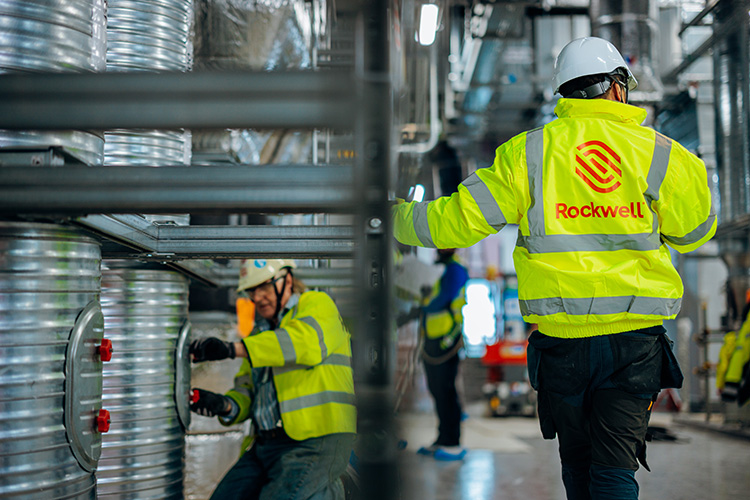
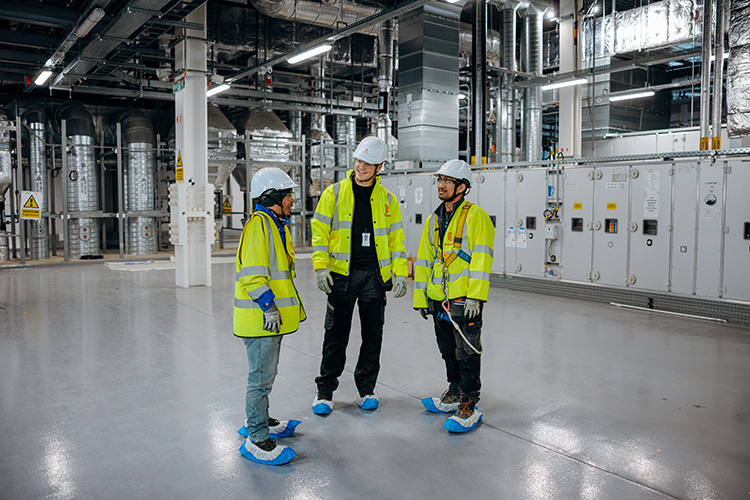
Recruitment at Rockwell
Discussing the workforce and plans to grow that workforce, Garret Murphy references the work being done by new HR director Joe Torpey and HR manager Lorraine O’Dea.
“Our HR director, Joe Torpey, is putting in place a plan that will enable us to bring in new people at ground-floor level and present them with a path to build a lifelong career within the company. To this end, we are engaging with third-level colleges and secondary schools to present the opportunities that exist at Rockwell.”
Of Rockwell’s 200-plus employees, over 60 are in engineering, technical, management, finance and HR roles, while over 160 are in trades roles.
“We are unique in that when we go to site, we have our own directly employed trades and workers. This is a massive benefit to us and our clients, as we can put the right people in the right place when needed.
“We started a programme called ‘Grown from Within’. With this, we are talking to our staff and asking them to get more people in. We need more graduates and more trades to develop the business, and we will give them the best opportunities within the business to develop their careers.
“This initiative has been well received. We have a growing number of young engineers who have been presented with clear paths to becoming future project and construction managers, and within the trades, we are offering similar routes to becoming gangers and foremen and also to build on qualifications achieved to date to become engineers, if they so wish.”
“Rockwell Engineering is ambitious, and we have a highly-skilled, motivated, and diverse staff, and we want to bring many more people on board to be part of the next chapter of this great company’s story.” – Garret Murphy, Managing Director, Rockwell Engineering
Diversity at Rockwell
Discussing diversity, Garret Murphy explains that while the company is firmly committed to improving the gender balance of its staff, the number of young women applying for positions is low. But the calibre of some of the female staff who have joined has been very impressive. He also says that although Rockwell is Irish-based, its mix of staff includes Irish, British, Filipino, Ukrainian, Serbian, Polish, Lithuanian, Latvian and Brazilian personnel across all areas.
Murphy says: “Like other companies, Rockwell is working towards better gender balance. However, it is challenging to find female staff in some fields. In our last apprenticeship drive, of the 156 CVs we received, only three were from female applicants. The key is to get into schools as early as possible, address the preconceptions young girls have about engineering and construction, and show them the reality and opportunities the sector has to offer them.”
He adds: “In our HR, finance and engineering teams, the balance between male and female personnel is very good. In the past while, we were delighted to have a number of very highly skilled female engineers from Ukraine join the team.”
International recruitment
Rockwell has doubled its trades staff over the past 18 months. This was achieved by local outreach to apprentices and tradespeople and by bringing in a large team of tradespeople from the Philippines.
“We have brought in many people from abroad, including a contingent of 35 tradespeople from the Philippines. These have been an amazing addition to the company. They have fitted in incredibly well from the start, have a fabulous work ethic, and are so positive in everything they do. Overall, I am delighted with how our recruitment drives have been going.”
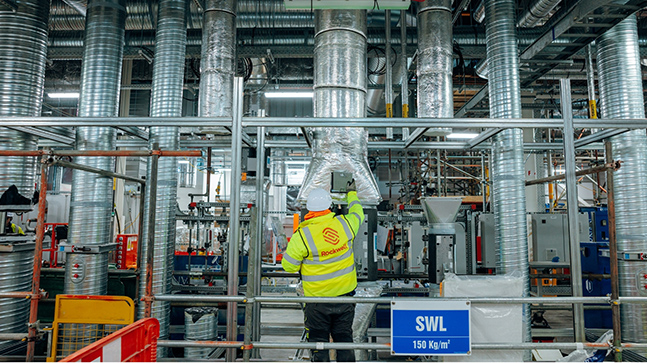
Sustainability at Rockwell
Rockwell is already delivering decarbonisation projects for clients and sees itself as a key Design & Build partner. However, it also has a clear focus on its own footprint and sustainability.
Garret Murphy has taken several steps in his private life to reduce his carbon footprint. He lives in a low-carbon home and has driven an electric car for several years. He believes his effort to reduce his carbon emissions gives him some appreciation of the challenges for the business and the sector.
“I have been able to make changes at a personal level that have reduced my carbon footprint, but reducing the carbon footprint of a company and, by extension, the wider business sector, particularly one so reliant on steel, is a big challenge. However, by taking a systematic approach, we can significantly reduce the business’s carbon emissions.
“To this end, we are taking a three-step approach. Firstly, we will address everything we can touch today. Secondly, we will look at all that we buy in, and thirdly, we will do what we can to help the sector address its carbon footprint.
“When I joined, I looked at Rockwell’s carbon footprint and asked what we could put in place that would have an immediate impact on reducing our emissions.
“In order to function, Rockwell Engineering requires a lot of power. We are in the process of moving all workshops, site offices and our head office to green energy.
“Next, we will transition our fleet to EVs. This will also require us to have the necessary charging infrastructure in place. Any vehicles in our fleet that can’t be switched to EVs will be, if possible, transitioned to hydrotreated vegetable oil (HVO).
“In 2025, we will look at our inputs. We see carbon steel as the biggest challenge. Finding suppliers in Europe that can provide an affordable carbon-neutral solution is challenging. There are a few operating at a small scale at the moment. So, the signs are promising, but it may take time.
“The need for carbon neutrality is being driven from the top of the supply chain, ie, the client. If the client is looking for a carbon-neutral steel solution and can pay for it, we would be the first to provide this for them. But a giant industry such as steel is a huge ship to try to turn around, and it will take time for solutions at scale to be delivered.”
He adds: “Once we have a better understanding and have made changes in our operations, we will be looking to see what we can do to affect change in the broader industry.”
Technology and lean
Rockwell is currently in the process of moving to a fully cloud-based project and operations management solution. Garret Murphy explains: “We are starting this off on the design and engineering side, but we will quickly move to have all project management, quality and safety functions managed in real-time in the cloud. This will bring huge benefits for our clients.
“We also have been operating at BIM 3D level on the design side of the business for many years. Mark Hall is our BIM managing engineer, and he is overseeing the roll-out of our expanded BIM functionality in the cloud system. All of our engineering and QS teams work in BIM 3D. Rockwell Engineering is an integrated company from a technology point of view, and we look forward to moving to the next level of technology with our operations.”
Murphy says as a manufacturer, Rockwell has lean embedded in its operations.
“We manufacture our own products. If we had a manufacturing plant and our manager sees a skip full of waste leaving the company every day, he knows this is costing money and is sustainably unsound, So it cannot be part of our manufacturing process.
“Everyone in Rockwell is focused on being lean and ensuring the cost of internal manufacturing is as cheap if not cheaper than buying in from somewhere else. To maintain this, our production process has to be efficient, and waste production kept to an absolute minimum.”
Off-site fabrication
Garret Murphy notes that there has been much conversation about offsite fabrication in the industry, but Rockwell has been carrying out offsite fabrication of ducting, pipework and cleanrooms since the 1980s.
“The company has always had its own off-site fabrication facilities, even back in the early 80s. We are an OSM manufacturer by default,” he comments. “While the industry now sees offsite as an important future capability, this has always been part of Rockwell Engineering. We have been manufacturing our own pipework and ductwork and bringing it to site for decades. But we have never really shouted about it. So, nobody knew the extent of our offsite capabilities.
“We are changing that now. We will also be advancing our offsite capabilities to fabricate even bigger modules and skids. And by talking about it to clients and offering them cost-effective solutions, we will ensure that there is a pipeline to support our facilities and staff expansion.”
Market conditions
The global crises and pandemic of the past few years have changed the face of business and how operations are run. There is now no room for error or waste. Everybody in Rockwell is playing their part in making it as efficient and innovative as possible.
Garret Murphy points out that these are all things he and his team can manage, but outside of his business, having a stable government and Ireland being seen by the international community as a safe and professional country to do business is another essential ingredient.
“I think the Irish government has managed the various global crises of the past few years really well. It is crucial that we maintain our position as a compassionate and stable country, so FDI companies continue to see us as a steady place in which to do business.
“If you talk to the clients, Ireland is seen as a safe place with a relatively compassionate and economically minded government. That’s important, and I hope it remains the case, particularly with so much upheaval happening in the world right now.”
Moving forward
In closing, Garret Murphy refers back to the plans being put in place for Rockwell Engineering for the coming years.
“As I said earlier, we have a new logo that hasn’t strayed too far from the old one. This reflects our plans for the business. I want to build on what has been achieved over the past 40 years. I want to grow the company without losing our focus on our people. I want FDI and other clients to know that Rockwell Engineering will go with them to meet their changing needs. Rockwell Engineering is ambitious, and we have a highly skilled, motivated, and diverse staff, and we want to bring many more people on board to be part of the next chapter of this great company’s story.
“I am confident we have the team in place to grow the business from 200 to 400 staff, and €40m to €80m in turnover and then beyond that, and I look forward to playing my part in making this happen,” Garret Murphy concludes.
To learn more about Rockwell Engineering, visit www.rockwell.ie




